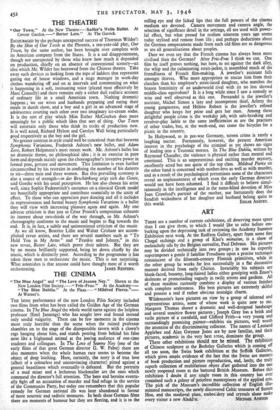THE THEATRE
ENCOURAGED by the perhaps unexpected success of Thornton Wilder': By the Skin of Our Teeth at the Phoenix, a ten-year-old play, Our
Town, by the same author, has been brought over complete with its American company from the States. It is a sad disappointment, though not unexpected by those who knew how much it depended on production, chiefly on an absence of conventional scenery—an idea which Mr. Wilder has borrowed from the Chinese theatre. Take away such devic;:s as looking from the tops of ladders that represents gazing out of house windows, and a stage manager in work-day clothes wandering off and on at intervals and commenting on what is happening in a soft, insinuating voice (played most effectively by Marc Connelly) and there remains only a rather dull realistic account of ordinary life in a small American town. Nothing dramatic happens ; we see wives and husbands preparing and eating their meals in dumb show, and a boy and a girl in an advanced stage of adolescence courting each other over two imaginary ice-cream sodas. It is the sort of play which Miss Esther McCracken does more amusingly for a public which likes that sort of thing. Our Town will entertain only those who think its tricks of production new. It is well acted, Richard Hylton and Carolyn Wall being particularly good respectively as the boy and the girl.
No greater contrast in style could well be conceived than that between Symphonic Variations, Frederick Ashton's new ballet, and Adam Zero, Robert Helpmann's most recent work. Mr. Ashton's ballet has no dramatic theme, no philosophical idea ; it is an exercise in pure form and depends mainly upon the choreographer's inventive power in formal pose, gesture and movement. This limitation is even further circumscribed by his restraint in confining the number of his dancers to six—three men and three women. But this prevailing economy is also a source of strength—in der Beschiinkung zeigt sick das Genie, said Goethe with his usual perception. He has also chosen his artist well, since Sophie Fedorovitch's costumes on a classical Greek model are beautifully appropriate and contribute essentially to the unity of effect. To those who can appreciate pure dancing and all it includes in expressiveness and formal beauty Symphonic Variations is a ballet they will view with increasing pleasure again and again. My one adverse criticism is that just as Cesar Franck's composition exhausts its interest about two-thirds of the way through, so Mr. Ashton's choreography conforms to the music and begins to flag towards the end. It is, in fact, a subtle and unintentional criticism of the music As we all know, Beatrice Lillie and Walter Crisham are accom- plished revue artists, and there are several numbers such as " To Hold You in My Arms " and " Frankie and Johnny," in this new revue, Better Late, which prove their talents. But they are by no means brilliantly supported, being let down chiefly by the music, which is distinctly poor. According to the programme it has taken three men to orchestrate the music. This is not surprising. What astonishes is that anyone could have thought most of it worth






























 Previous page
Previous page